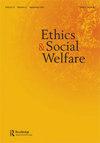编辑
IF 0.9
Q4 SOCIAL WORK
引用次数: 0
摘要
被道德委员会拒绝的经历,以及她如何尽可能积极地应对,同时应对复杂情况的情绪。Annick Richterich的这篇论文探讨了她在精神健康方面使用“康复方法”的经验,并将其应用于痴呆症患者的工作中。她在新西兰奥克兰大学(University of auckland, Aotearoa/New Zealand)工作,对相关文献进行了批判性的回顾,并结合了她在自己所在地区的痴呆症护理经验,但与往常一样,这个话题具有广泛的相关性。她所关心的是如何照顾好痴呆症患者,她的结论是,文献和她的经历支持了伦理概念的重要性,她推荐的重点是:联系、希望、身份、意义和赋权。本文章由计算机程序翻译,如有差异,请以英文原文为准。
Editorial
experience of rejection by an ethics committee, and how she reacted as positively as she could, whilst coping with the emotions of a complex situation. The paper by Annick Richterich examines her experience of using the ‘ recovery approach ’ to mental health, and applying it in work with people living with dementia. Working out of the University of Aukland, Aotearoa/New Zealand, she bases herself on a critical review of rel-evant literature as well as her experience of dementia care in her part of the world, but as so often, the topic is widely relevant. Her concern is with caring well for dementia patients, and she concludes by suggesting that the literature and her experience supports the importance of ethical concepts summed up in her recommended focus on: connectedness, hope, identity, meaning and empowerment.
求助全文
通过发布文献求助,成功后即可免费获取论文全文。
去求助
来源期刊

Ethics and Social Welfare
SOCIAL WORK-
CiteScore
1.60
自引率
20.00%
发文量
36
期刊介绍:
Ethics and Social Welfare publishes articles of a critical and reflective nature concerned with the ethical issues surrounding social welfare practice and policy. It has a particular focus on social work (including practice with individuals, families and small groups), social care, youth and community work and related professions. The aim of the journal is to encourage dialogue and debate across social, intercultural and international boundaries on the serious ethical issues relating to professional interventions into social life. Through this we hope to contribute towards deepening understandings and further ethical practice in the field of social welfare. The journal welcomes material in a variety of formats, including high quality peer-reviewed academic papers, reflections, debates and commentaries on policy and practice, book reviews and review articles. We actively encourage a diverse range of contributions from academic and field practitioners, voluntary workers, service users, carers and people bringing the perspectives of oppressed groups. Contributions might include reports on research studies on the influence of values and ethics in social welfare practice, education and organisational structures, theoretical papers discussing the evolution of social welfare values and ethics, linked to contemporary philosophical, social and ethical thought, accounts of ethical issues, problems and dilemmas in practice, and reflections on the ethics and values of policy and organisational development. The journal aims for the highest standards in its published material. All material submitted to the journal is subject to a process of assessment and evaluation through the Editors and through peer review.
 求助内容:
求助内容: 应助结果提醒方式:
应助结果提醒方式:


